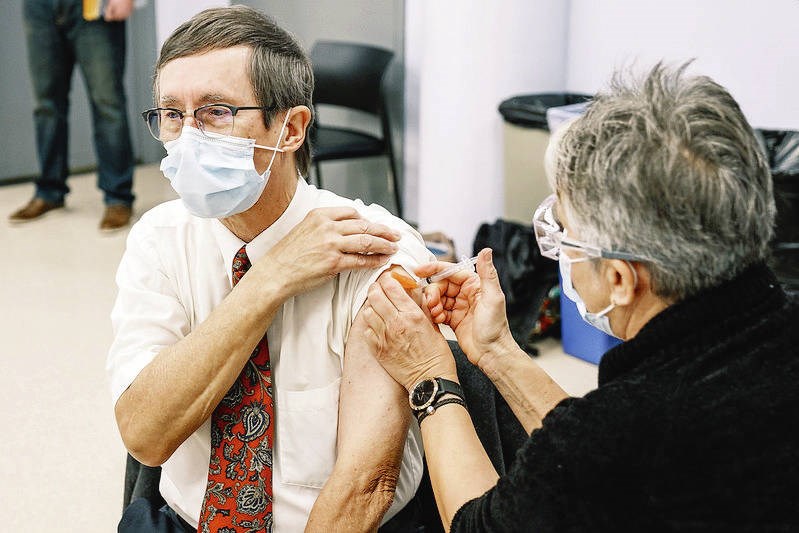It took close to 10 months for Vancouver Island to record its first 1,000 COVID cases. The next 500 appeared in just the past 3½ weeks.
And while much of that rise was in the central Island, now authorities are just as worried by a spike of cases in the south. Nanaimo has seen a jump, too.
And yes, the maddening delay in vaccine supply is hurting the ability to contain the virus.
So, no, says Dr. Richard Stanwick, this is not the time for pandemic-weary Islanders to ease up, no matter how much we just want it all to be over.
If it makes you feel any better (and it shouldn’t), Stanwick, Island Health’s chief medical health officer, is feeling the weight, too. He’s kept awake at night by what the medical literature calls COVIDsomnia.
Hence his message at a Wednesday news conference: bear down, and not just in the mid-Island, where the recent focus has been.
“As of today, south Island is almost equalling the number of [new] cases as central island,” Stanwick said. “We are as concerned at this point in time about what we’re seeing in south Island as we’re seeing currently in the central Island. We may, in fact, have a cluster of cases that we’ll be announcing in the south Island in the next day or so.” There were a near-record 45 new cases Island-wide Wednesday, including 20 in the south and 22 in the central Island.
Stanwick echoed Dr. Bonnie Henry in calling on people to buckle down to control the spread.
“We are so close to that tipping point. We have seen other communities and certainly other countries where it reaches that point where transmission just starts happening at such a rapid pace that contact tracing and testing cannot keep up with it.”
He oozed frustration over the international squabbling and hoarding that has stalled the delivery of vaccines, hurting Island Health’s distribution plans.
“We keep being shorted on the vaccine. It’s disappointing, because we had really good plans to roll it out to the most vulnerable populations to really blunt the possibility of seeing the outbreaks we are …. Had vaccine been available in greater amounts and we were able to deliver it sooner, we wouldn’t be seeing the 500 cases in the last three weeks, compared to the thousand that took literally months to arrive on the Island.”
As of Wednesday, 24,065 people on Vancouver Island had received their first dose of the vaccine, including all those residents of long-term care and assisted-living homes who wanted one. The health authority is now identifying people in acute care who are waiting for placement in long-term facilities.
Others who expected to be vaccinated have been disappointed. “We’ve been selling hope, saying ‘you’re probably going to get it in the next couple of weeks, count on it,’ and then we have to say ‘your appointment is cancelled,’ ” Stanwick said.
Even in acute-care facilities, vaccines are being limited to those who deal with COVID cases in intensive care or emergency units. “It’s got to the point where we may have to ration it to only those hospitals where there are COVID units.”
Next challenge: figuring out how to do a mass inoculation of Vancouver Islanders across 33 communities when the vaccine finally does show up in volume.
Some of those Islanders are more vulnerable than others. Members of the Cowichan Tribes continue to shelter in place. Indigenous populations have been four times as susceptible as others.
All Islanders are vulnerable, though. While much has been made about the risk of COVID being brought here by travellers, Stanwick said community infections are proving a greater threat. Some of us didn’t keep apart as told over the holidays, and we’re now seeing the results. “It is family to family, relative to relative, individuals who come together as friends.”
He wonders what will follow Chinese New Year, the Super Bowl, Family Day and Valentine’s Day. He worries that many of us treat workmates as members of our families, instead of masking up and keeping our distance as we would with strangers.
Still, he says, people have mostly shown that obeying the rules helps stem the tide. When the U.K. variant appeared on the Island, it was contained because the person who brought it here, plus two contacts, isolated themselves. Strict adherence to rules has spared most Island long-term-care facilities. Effective contact tracing means 700 Islanders being in 14-day isolation right now.
So, tired as you may be, keep rowing, because it beats sinking.
jknox@timescolonist.com



